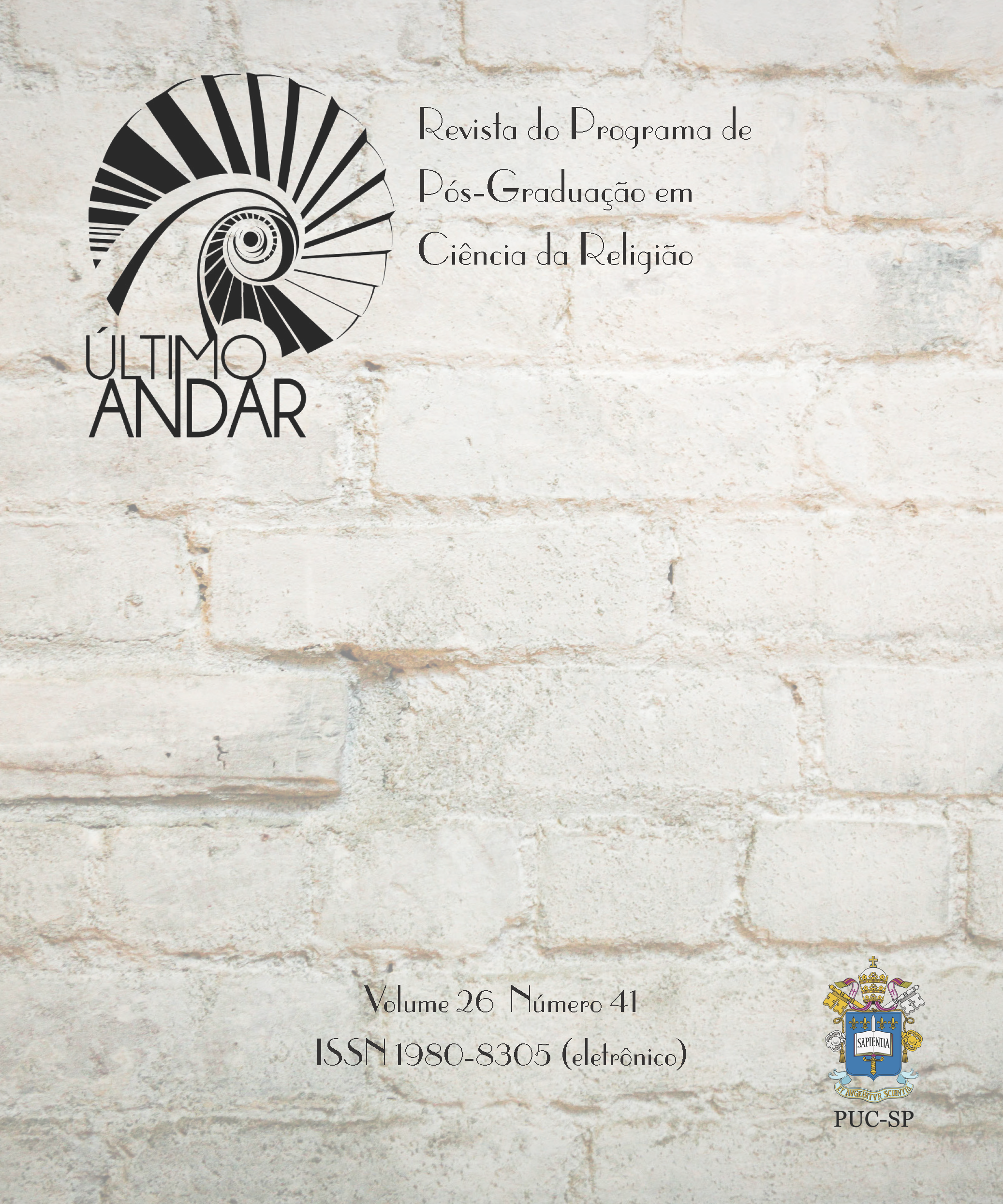Hans Jonas e a reflexão sobre Deus e ética após Auschwitz
DOI:
https://doi.org/10.23925/ua.v26i41.e58166Palavras-chave:
Auschwitz, Deus, Ética, Mal, TeodiceiaResumo
Os horrores do século XX, dos quais o episódio de Auschwitz destaca-se como emblemático referencial, colocaram em questão a representação de um Deus absolutamente bom e onipotente, em razão da incompatibilidade lógica desses atributos com o mal radical ocorrido. Este artigo propõe-se a explorar a reflexão do filósofo Hans Jonas, que ensaia uma narrativa de Deus considerando a sua ausência na tragédia da Shoah. Refutando as justificativas racionais da teodiceia, Jonas busca uma nova perspectiva através de um mito cosmogônico, no qual Deus autorrenuncia à onipotência em prol da autonomia cósmica, expondo-se às contingências do mundo, inserindo-se no devir do espaço-tempo e por ele sendo afetado. A abdicação voluntária de Deus promove a autonomia do homem, posicionando-o em um horizonte ético, no qual é responsável, não só por si próprio, mas por toda a criação e, até mesmo, pelo plano de Deus, que é impactado pelas ações e omissões humanas.
Referências
BECKERT, Cristina. Teologia depois da Shoah: a crítica de Hans Jonas a teodiceia. Revista Portuguesa de Filosofia. Lisboa, n. 57, O Mal e a(s) teodiceia(s): novos Aspectos Sapienciais, p. 733-744, 2001.
CABRAL, Alexandre Marques. Hans Jonas, gnosticismo e a questão de Deus:
entre redenção da natureza e compromisso ético. Numen - revista de estudos e pesquisa da religião. Juiz de Fora, v. 18 n. 1, Seção Temática: Religião e Natureza, p. 9-35, 2015.
CHALIER, Catherine. Dieu sans puissance. In : JONAS, Hans. Le concept de Dieu après Auschwitz : une voix juive. Paris : Payot & Rivages, 1994. p. 53-92.
CLAVIER, Paul. Le concept de Dieu après Jonas Aveux d'impuissance, aveux contradictoires ? Revue philosophique de Louvain. Louvain, v. 113, n. 4, p. 569-597, 2015.
DOSTOIÉVSKI, Fiódor. Os irmãos Karamázov. Trad.: Paulo Bezerra. São Paulo: Editora 34, 2013.
EPICURO. Antologia de textos de Epicuro. In: Antologia de textos / Epicuro. Da natureza / Tito Lucrécio Caro. Da república / Marco Túlio Cícero. Consolação a minha mãe Hélvia; Da tranquilidade da alma; Medéia; Apocoloquintose do divino Cláudio / Lúcio Aneu Sêneca. Meditações / Marco Aurélio; traduções e notas de Agostinho da Silva ... (et al.); 3. ed. — São Paulo: Abril Cultural, 1985, p. 13-20. (Os pensadores).
FROGNEUX, Nathalie. Mito. In: OLIVEIRA, Jelson; POMMIER, Eric. Vocabulário Hans Jonas. Caxias do Sul: Educs, 2019. p. 155-161.
FROGNEUX, Nathalie. Une aventure cosmothéandrique : Hans Jonas et Luigi Pareyson. Revue Philosophique de Louvain. Louvain, quatrième série, v. 100, n. 3, p. 500-526, 2002.
GIACOIA JUNIOR, Oswaldo, Nathalie. Responsabilidade. In: OLIVEIRA, Jelson; POMMIER, Eric. Vocabulário Hans Jonas. Caxias do Sul: Educs, 2019. p. 215-229.
HILLESUM, Etty. Diário: 1941-1943. 5. ed., Lisboa: Assírio & Alvim, 2009.
JONAS, Hans. Immortality and the Modern Temper: The Ingersoll Lecture, 1961. The Harvard Theological Review. Cambridge, v. 55, n. 1, p. 1-20, 1962.
JONAS, Hans. Heidegger e a Teologia. Tradução de Wendell E. Soares Lopes. Revista de Filosofia Aurora. Curitiba, v. 28, n. 43,, p. 331-362, 2016a.
JONAS, Hans. Le concept de Dieu après Auschwitz : une voix juive. Paris : Payot & Rivages, 1994.
JONAS, Hans. Matéria, espírito e criação. Petrópolis: Vozes, 2010.
JONAS, Hans. O conceito de Deus após Auschwitz: uma voz judia. São Paulo: Paulus, 2016b.
JONAS, Hans. O princípio responsabilidade: ensaio de uma ética para a civilização tecnológica. Rio de Janeiro: Contraponto; Ed. PUC-Rio, 2006.
LEIBNIZ, Gottfried Wilhelm. Ensaios de teodiceia sobre a bondade de Deus, a liberdade do homem e a origem do mal. 2. ed. São Paulo: Estação Liberdade, 2017.
MAIMÔNIDES. Guia dos perplexos: obra completa. São Paulo: Sêfer, 2018. E-book.
MAIMÔNIDES. Os 613 mandamentos: Tariag Há-Mitzvoth /Moshé Ben Mainon: São Paulo: Nova Stella, 1990.
NIETZSCHE, Friedrich. A gaia ciência. São Paulo: Companhia da Letras, 2007.
PINSART, Marie-Geneviève. Jonas et la liberté: dimensions théologiques, ontologiques, éthiques et politiques. Paris: Librairie Philosophique J. Vrin, 2002.
POMMIER, Eric. A improvidência Divina. In: JONAS, Hans. O conceito de Deus após Auschwitz: uma voz judia. São Paulo: Paulus, 2016. p. 7-15.
QUEIRUGA, Andrés Torres. Repensar o Mal: Da Ponerologia à Teodicéia. Trad. Afonso Maria Ligorio Soares. São Paulo: Paulinas, 2011. E-book.
REA, Caterina. Retrait de Dieu et question du mal : une lecture éthique du mythe de Hans Jonas. Revue philosophique de Louvain. Louvain, v. 100, n. 3, p. 527-548, 2002.
RICHARD, Jean. La question de Dieu chez Hans Jonas. In : LANGLOIS, Luc ; ZARKA, Yves Charles (org.). Les philosophes et la question de Dieu. Paris : Presses Universitaires de France, 2006. p. 367-381.
SCHOLEM, Gershon. A cabala e seu simbolismo. São Paulo: Perspectiva, 2015.
SCHOLEM, Gershon. Conceptos básicos del judaísmo: Dios, Creación, Revelación, Tradición, Salvación. 3. ed. Madrid: Trotta, 2008.
SOLÈRE, Jean-Luc. Le concept de Dieu avant Hans Jonas: Histoire, création et toute-puissance. Mélanges de Science Religieuse, v. 53, n. 1, p. 7-37, 1996.
Downloads
Publicado
Como Citar
Edição
Seção
Licença
Copyright (c) 2023 Luiz Fernando Pires Dias

Este trabalho está licenciado sob uma licença Creative Commons Attribution-NonCommercial 4.0 International License.
Autores que publicam nesta revista concordam com os seguintes termos:
- Autores mantém os direitos autorais e concedem à revista o direito de primeira publicação, com o trabalho simultaneamente licenciado sob a Licença Creative Commons Attribution que permite o compartilhamento do trabalho com reconhecimento da autoria e publicação inicial nesta revista.
- Autores têm autorização para assumir contratos adicionais separadamente, para distribuição não-exclusiva da versão do trabalho publicada nesta revista (ex.: publicar em repositório institucional ou como capítulo de livro), com reconhecimento de autoria e publicação inicial nesta revista.
- Autores têm permissão e são estimulados a publicar e distribuir seu trabalho online (ex.: em repositórios institucionais ou na sua página pessoal) a qualquer ponto antes ou durante o processo editorial, já que isso pode gerar alterações produtivas, bem como aumentar o impacto e a citação do trabalho publicado.


